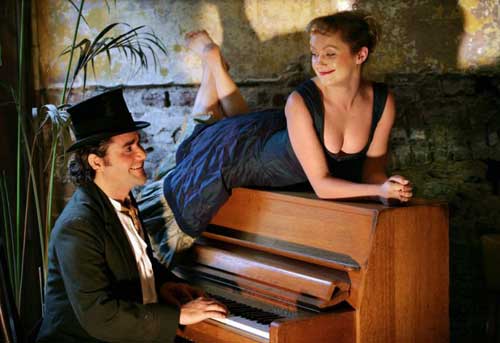The Portrait of a Lady, Theatre Royal, Bath<br/>Nocturne, Almeida, London<br/>Wink the Other Eye, Wilton's Music Hall, London
A back-to-front narrative should never come to halt – but a disappointing evening of vaudeville should

Your support helps us to tell the story
From reproductive rights to climate change to Big Tech, The Independent is on the ground when the story is developing. Whether it's investigating the financials of Elon Musk's pro-Trump PAC or producing our latest documentary, 'The A Word', which shines a light on the American women fighting for reproductive rights, we know how important it is to parse out the facts from the messaging.
At such a critical moment in US history, we need reporters on the ground. Your donation allows us to keep sending journalists to speak to both sides of the story.
The Independent is trusted by Americans across the entire political spectrum. And unlike many other quality news outlets, we choose not to lock Americans out of our reporting and analysis with paywalls. We believe quality journalism should be available to everyone, paid for by those who can afford it.
Your support makes all the difference.Has someone confused Henry James with Leonardo da Vinci? This is The Portrait of a Lady – the novelist's 1881 masterpiece about Americans on the Grand Tour – but it's as if Nicki Frei's new adaptation has been penned in mirror writing.
That is to say, Peter Hall's production – part of his Bath rep season – moves backwards through the story. So, we start with the heiress Isabel (Catherine McCormack) wretched in Rome, stuck in her unwise marriage to the gold-digger Osmond (Finbar Lynch). Next we witness him as her suitor, posing as a pure aesthete. Then she is seen crossing paths with other admirers as we jump-cut back to the day she first arrived in England, determined to be an independent young woman.
I don't mind the inverse story-telling, though Pinter's Betrayal does it better. As one watches McCormack in rewind, becoming more happily girlish, it is akin to remembering things past. It generates a sense of mild nostalgia for lost innocence. The really chronic problem is that, within each scene, the clock appears to be merely winding down. The pace of line-delivery slows to a crawl as Lynch and Niamh Cusack (playing his intimate, Madame Merle) over-egg their scheming pauses and Machiavellian smiles. It is astounding that Isabel can note the fine brushwork in Osmond's art collection when she seems blind to such villainously unsubtle acting.
Generally, the cast appear stiff – perhaps under-rehearsed – though Susie Trayling is amusingly energetic as Isabel's pushy companion, Henrietta Stackpole. Now and then, everybody grinds to a complete halt, striking tableaux. Though the period costumes are very fine – ruched silks and velvets – Miss Archer's continental travels appear to be dismally confined to one black marble cloister. Dull video projections of Roman and Florentine rooftops – with the odd wheeling bird – do nothing to animate the proceedings.
If James envisaged Isabel going to "affront her destiny" in Europe, what was the tomboyish kid-sister of Nocturne's narrator doing when she stepped out of their front garden in Illinois, straight under the wheels of his Buick Electra? He wonders if it was chance, "God's ugly deck of cards", or if she harboured some death wish, foreseeing a stultifying life of suburban marital tedium.
Written by Adam Rapp and beautifully performed by Peter McDonald, this is a monologue which replays the fatal accident in obsessive detail. In this case, the slow-motion effect is gripping. With indirect allusions to Greek tragedy, the narrator then proceeds to chart the repercussions down the next 15 years, including the mental disintegration of his staid parents.
Rapp is most definitely talented. His descriptions are often unforgettably vivid. When the narrator's father points a gun in his face, he describes its muzzle, "the hole like a little iron nostril", and then the feel of the cylinder in his mouth, "like kissing the engine of a toy train".
However, this writer doesn't know when to stop: something of an irony given the Buick's failing brakes. Obsession becomes tedious when he indulges in strings of similes and Thesaurus-style synonyms. Maybe Nocturne ultimately feels prolix because it is really a short story masquerading as a theatre piece.
McDonald's performance is superbly understated, casual in a plaid shirt but with simmering bitterness. Would that Matt Wilde's staging trusted in simplicity. Nocturne is part of the Almeida's music theatre season, but the interludes of melancholy piano chords (composed by Phillip Neil Martin) feel intrusive, as do the bouts of pseudo-arty video projection.
From multimedia, we travel back to old-school music hall. Tucked down an alley in the East End of London, Wilton's is the world's last surviving grand music hall: a beautifully crumbling vaulted chamber with gilded barley-twist columns. You can almost see the flitting ghosts. And Wink the Other Eye promises to whirl you back to Wilton's heyday when the reeling comedian Champagne Charlie was making his name here, the stage was awash with high-kicking bloomers and 1,500 locals regularly crammed in to sing along.
But, oh, what a woeful disappointment this divertissement is, ineffectually written and directed by Angus Barr (formerly of Ridiculusmus). His struggling ensemble doesn't have nearly enough rumbustious brio, and as for daredevil acrobatics – no one can do more than a backbend. As I stumbled away at the end– having endured 30 unbelievably unfunny songs – I could only wonder why this witless stuff wasn't knocked on the head in the 1850s, never to be reprised.
'The Portrait of a Lady' (01225 448844) to 9 Aug, then touring; 'Nocturne' transfers to the Traverse, Edinburgh (0131-228 1404) 31 Jul-10 Aug; 'Wink the Other Eye' (020-7702 2789) to 16 Aug
Join our commenting forum
Join thought-provoking conversations, follow other Independent readers and see their replies
Comments